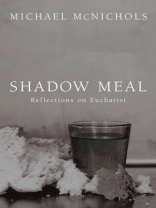Many Protestant Evangelicals struggle to find meaning in the Lord’s Supper. There may be theological positions to be held and certain religious protocols to be observed, but for many the Eucharist remains merely a symbol of remembrance and as such, an elusive connection to the table of Jesus. As new conversations take place about the emerging and missional church, the value of the ancient practices of the church are seeking new expression. However, since many in these conversations come from non-sacramental backgrounds, the Eucharist can easily become a utilitarian addendum to alternative church experiments.
In reflecting on the invitation from Jesus, quoted by Paul in 1 Corinthians 11:23-26, to ‘do this, ‘ the question is asked, ‘What is this?’ Shadow Meal challenges the idea that this is something containable or negotiable and suggests instead that this has much more to do with the invitation and presence of Jesus than it does with ecclesiastical practices or prescribed rituals.
Shadow Meal seeks to offer Protestants some new images of the Eucharist and to foster a deeper appreciation of and connection to the presence of Jesus in the invitation to dine at his table. It offers new language to pastors and leaders who hope to find ways to frame the missional life of Christian faith for people whose lives cry out to be formed by the present reality of God’s kingdom.
关于作者
Richard J. Mouw earned his Ph D in Philosophy from the University of Chicago, and he taught for seventeen years at Calvin College. Mouw then served as the president of Fuller Theological Seminary in Pasadena, California, for two decades. In 2013 he stepped down and became the professor of faith in public life at Fuller. He is the author of many essays and books, and has lectured and preached widely in China.







![的封面 Brian Schrag & Julisa Rowe: Community Arts for God's Purposes [Chinese] 貼近神心意的社群藝術 的封面 Brian Schrag & Julisa Rowe: Community Arts for God's Purposes [Chinese] 貼近神心意的社群藝術](https://static.worldofdigitals.com/thumb_webp/740/9781645083740.webp)




